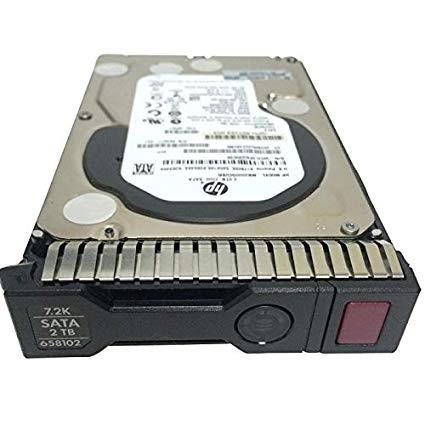When it comes to maintaining a reliable and efficient server infrastructure, selecting the right server hard drive is critical. If you opt for the right server hard drive meeting your needs, budget and future expansion plans, you are all set to experience massive growth acing all your IT related dreams.
In short server hard drives are designed to handle high workloads, ensuring data integrity, speed, and reliability in demanding environments. In this guide, we will compare four notable server hard drives for you so you can make informed buying decisions. So, without further ado, let’s dive into the core details of the topic.
What are Server Hard Drives – Understanding the Basics
In simple words, server hard drives are specialized storage devices designed to handle the intense workloads and high demands of server environments. These drives are built for durability, speed, and reliability.
Moreover, they ensure data is available and protected under heavy use. They often feature advanced technologies such as:
-
Dual-port connectivity
-
Hot-swapping capabilities
-
Higher rotational speeds (RPM)
Best Server Hard Drives to Meet Your Needs in 2024
HPE 300GB Internal Hard Drive – 507127-B21
Specifications and Features
-
Capacity: 300GB
-
Interface: SAS 6Gb/s
-
Rotational Speed: 10,000 RPM
-
Form Factor: 2.5 inches
-
Dual Port: Yes
-
Hot Swap: Yes
Unique Benefits of the Product
-
You can enjoy quick data access times due to its 10,000 RPM rotational speed
-
Dual port capability empowers you and your team with top-tier redundancy and improved data availability
-
You can leverage easy drive replacement or addition without downtime with hot swap functionality
Use Cases
It is an ideal server hard drive for small to medium-sized businesses. Moreover, if reliable performance and quick data access for databases, web servers, and other applications is important to your business, then it is your ultimate gateway.
HPE 300GB Internal Hard Drive – EH0300FBQDD
Specifications and Features
-
Capacity: 300GB
-
Interface: SAS 6Gb/s
-
Rotational Speed: 15,000 RPM
-
Form Factor: 2.5 inches
-
Hot Swap: Yes
-
Smart Carrier: Yes
Unique Benefits of the Product
-
With 15,000 RPM rotational speed you can enjoy exceptional performance
-
Smart Carrier Technology enables you to perform advanced diagnostics and monitoring
-
Hot Swap Capability ensures uninterrupted server operations
Use Cases
EH0300FBQDD is best suited for high-performance environments, such as:
-
Financial services
-
Online transaction processing (OLTP)
-
Real-time analytics
HP 73GB Hard Disk Drive – 507129-008
Specifications and Features
-
Capacity: 73GB
-
Interface: SAS 6Gb/s
-
Rotational Speed: 15,000 RPM
-
Form Factor: 2.5 inches
-
Dual Port: Yes
-
Hot Swap: Yes
Unique Benefits of the Product
-
15,000 RPM speed for rapid data access for demanding applications
-
Dual port connectivity for enhanced reliability and data availability
-
Hot swap functionality for seamless drive replacement without downtime
Use Cases
It is an ideal hard drive for businesses and enterprises with limited storage needs but requiring high-speed performance, including:
-
Specialized database servers
-
Transaction-heavy environments
WD HGST 14TB Internal Hard Drive – WUH721414AL4204
Specifications and Features
-
Capacity: 14TB
-
Interface: SAS 12Gb/s
-
Rotational Speed: 7,200 RPM
-
Form Factor: 3.5 inches
-
Cache: 512MB
-
Sector Size: 4Kn / SE
Unique Benefits of the Product
-
14TB of storage capacity for large-scale data storage needs
-
SAS 12Gb/s interface for faster data transfer rates
-
512MB cache for improved read/write speeds and efficiency
Use Cases
WUH721414AL4204 is perfect for enterprise environments with vast data storage requirements, including:
-
Big data analytics
-
Archiving
-
Large-scale data warehousing
End-to-end Comparison of Server Hard Drives
The RPM War – Comparing Performance
When comparing performance, the rotational speed (RPM) is a key factor. The HPE 300GB (EH0300FBQDD) and HP 73GB (507129-008) drives with 15,000 RPM offer the fastest data access speeds, making them ideal for performance-critical applications.
The HPE 300GB (507127-B21) with 10,000 RPM drive also provides robust performance but falls slightly behind the 15,000 RPM models.
Lastly, WD HGST Ultrastar (WUH721414AL4204), despite having a lower RPM (7,200), compensates with its higher interface speed (12Gb/s) and large cache, As a result, it is best-fit for large data volumes rather than high-speed access.
Storage Debate – Which Drive Won the Battle?
The WD HGST Ultrastar DC HC530 stands out with a massive 14TB capacity, dwarfing the 300GB and 73GB offerings from HPE and HP. This makes it the go-to option for environments requiring substantial storage space.
The other drives, with their smaller capacities, are better suited for high-performance tasks with moderate storage needs.
Interface and Connectivity
The HPE and HP drives utilize a 6Gb/s SAS interface, which provides sufficient bandwidth for their performance characteristics.
On the other hand, WD HGST Ultrastar’s 12Gb/s SAS interface offers double the bandwidth, beneficial for data-intensive applications requiring fast data transfer rates.
Additionally, dual port connectivity in the HPE 300GB 10,000 RPM and HP 73GB drives enhances reliability and failover support, which is crucial for maintaining continuous operation in critical environments.
Hot Swap and Smart Features – Downtime Reduction Champion
All the drives in this comparison support hot-swapping, which is essential for minimizing downtime during maintenance.
In addition to it, HPE 300GB with Smart Carrier also offers advanced monitoring and diagnostics, ensuring optimal drive health and performance over time.
How to Choose the Right Server Hard Drive – Time to Make a Decision
Do You Often Encounter High-Performance Needs?
If your primary concern is achieving the highest possible performance for transaction-heavy applications, the HPE 300GB and HP 73GB drives are the way to go.
Moreover, their high rotational speeds and dual port capabilities make them well-suited for demanding environments. Specifically, the realms where speed and reliability are paramount.
Is Balanced Performance and Capacity Your Priority?
The HPE 300GB drive offers a good balance of speed and capacity, making it suitable for a variety of applications that require both performance and moderate storage space. Its dual port feature and hot-swap capability add to its reliability and ease of maintenance.
Are You Facing Large-Scale Storage Challenges?
Do you encounter applications requiring vast amounts of storage, such as:
-
Big data
-
Cloud storage
-
Data archiving
If this is you then WD HGST Ultrastar DC HC530 is what you should opt for. Its 14TB capacity, coupled with a 12Gb/s SAS interface and large cache, provides the necessary tools to handle massive data volumes efficiently.
FAQs
What is the importance of rotational speed (RPM) in server hard drives?
Rotational speed (RPM) determines how quickly the drive can read and write data. Higher RPMs generally mean faster data access times, which is crucial for performance-intensive applications.
Why is dual port connectivity beneficial?
Dual port connectivity provides redundancy and failover support, ensuring continuous data availability even if one port fails. This is essential for maintaining uptime in critical server environments.
What does hot-swapping mean, and why is it important?
Hot-swapping allows drives to be replaced or added without shutting down the server. This minimizes downtime and ensures continuous operation, which is vital for business continuity.
How does the cache size affect drive performance?
A larger cache can significantly improve drive performance by storing frequently accessed data for quicker retrieval. This is particularly beneficial for high-volume data transfers and large file processing.
When should I choose a drive with a higher capacity over one with higher speed?
Choose a higher capacity drive if your application requires storing large amounts of data, such as in data centers or for big data analytics. Opt for higher speed drives if you need rapid data access for transaction-heavy or performance-critical applications.
Wrapping Up
At this point, you are well aware of the four server hard drives discussed above. Now, if you are ready to make a purchase, we recommend you should visit Direct Macro and make informed buying decisions.
With over 500 positive ratings on Shopper Approved, they are known for high quality new and refurbished IT hardware products. Good luck!





